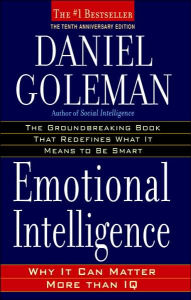7. Emotional Intelligence - Daniel Goleman (📖)
21 Feb 2017
rating 9/10
Reading Notes:
In a very real sense we have two minds, one that thinks and one that feels.
“Life is a comedy for those who think and tragedy for those who feel.” – Horace Walpole
At best, IQ contributes about 20 percent to the factors that determine life success, which leaves 20 percent to the other forces. “The vast majority of one’s ultimate niche in society is determined by non-IQ factors, ranging from social class to luck.”
Much evidence testifies that people who are emotionally adept – who know and manage their own feelings well, and who read and deal effectively with other people’s feelings – are at an advantage in any domain of life.
Interpersonal intelligence is the ability to understand other people: what motivates them, how they work, how to work cooperatively with them.
Metacognition – the awareness of one’s mental processes.
And in the day-to-day world no intelligence is more important than the interpersonal. If you don’t have it, you’ll make poor choices about who to marry, what job to take, and so on.
-
Knowing one’s emotions. Self – awareness – recognizing a feeling as it happens – is the keystone of emotional intelligence. An inability to notice our true feelings leaves us at their mercy. People with greater certainty about their feelings are better pilots of their lives, having a surer sense of how they really feel about personal decisions from whom to marry to what job to take.
-
Managing emotions. Handling feelings so they are appropriate is an ability that builds on self-awareness.
-
Motivating oneself. People who have this skill tend to be highly productive and effective in whatever they undertake.
-
Recognizing emotions in other. Empathy, is the fundamental “people skill”. People who are empathetic are more attuned to the subdue social signals that indicate what others need or want.
-
Handling relationships. The art of relationships is, in large part, skill in managing emotions in others.
Socrates’s injunction “Know Thyself” speaks to the keystone of emotional intelligence: awareness of one’s own feelings as they occur.
Psychologists use the rather ponderous term ‘metacognition’ to refer to an awareness of thought process, and ‘metamood’ to mean awareness of one’s own emotions.
Zillmann finds that a universal trigger for anger is the sense of being endangered. Endangerment can be signaled not just by an outright physical threat but also, as is more often the case, by a symbolic threat to self-esteem or dignity.
Self-efficacy, the belief that one has mastery over the events of one’s life and can meet challenges as they come up.
Empathy builds on self-awareness; the more open we are to our own emotions, the more skilled we will be in reading feelings.
The key to intuiting another’s feelings is in the ability to read nonverbal channels: tone of voice, gesture, expression, and the like.
Psychopathy, the incapacity to feel empathy or compassion of any sorts.
“Popular” and “charming” are terms we use for people we like to be with because their emotional skills make us feel good.
Leadership is not domination, but the art of persuading people to work toward a common goal.